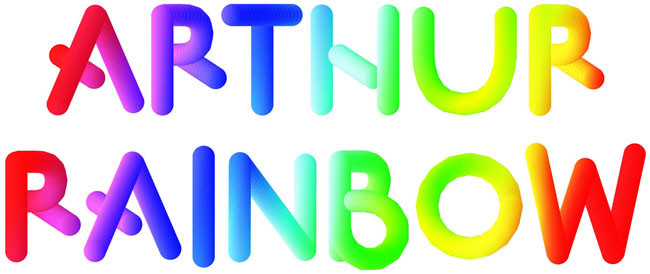Arthur Rainbow
09 Mar - 14 Apr 2012
ARTHUR RAINBOW
9 March - 14 April, 2012
! Air de Paris celebrate its 22nd springtime !
featuring Stéphane DAFFLON, Sister Corita KENT, Dorothy IANNONE, Pierre JOSEPH, Rob PRUITT and Lily van der STOKKER
Vowels
Black , white , red , green , blue : you vowels,
Some day I'll tell the tale of where your mystery lies:
Black , a jacket formed of hairy, shiny flies
That buzz among harsh stinks in the abyss's bowels;
White , the white of kings, of moon-washed fogs and tents,
Of fields of shivering chervil, glaciers' gleaming tips;
Red , magenta, spat-up blood, the curl of lips
In laughter, anger, or besotted penitence;
Green , vibrating waves in viridescent seas,
Or peaceful pastures flecked with beasts – furrows of peace
Imprinted on our brows as if by alchemies;
Blue , great Trumpet blaring strange and piercing cries
Through Silences where Worlds and Angels pass crosswise;
Omega, O, the violet brilliance of Those Eyes!
Arthur Rimbaud (translated by George Dance)
Do we really have the right to use the iconic poem of Symbolist synaesthesia and tweak the name of its creator for a group exhibition of works in which colour appears arrayed in transformative virtues?
It is with great pleasure that we freely associate works whose common feature is granting colour a liberating, not to say ecstatic power: whether religious (Sister Corita KENT), tantric (Dorothy IANNONE), everyday (Lily van der STOKKER), formal (Stéphane DAFFFLON), overtly caustic (Rob PRUITT) or reflexive (Pierre JOSEPH).
Obviously, too, we're happy to note that religious and militant messages can make use of advertising and Pop Art forms (Sister Corita KENT); that forms of plenitude like colour field painting can generate a feeling of unease (Rob PRUITT); that colours can unabashedly fill a perfectly banal function (Lily van der STOKKER); that their use by an artist can vary formally between the beginning of a career and the latest works, while still conveying the same passionate message (Dorothy IANNONE); that their arrangement is above all formal (Stéphane DAFFLON); and the fact that colour can give rise to reading (Pierre JOSEPH).
Whatever the message and whatever the medium, colour will be seen as possessing a host of qualities, not the least of them being bringing people together, under a banner or in front of a work of art. Sister Corita KENT has done both.
And anyway, rereading RIMBAUD has never done anyone any harm. Nor has looking at works whose colours are (completely) satisfying
9 March - 14 April, 2012
! Air de Paris celebrate its 22nd springtime !
featuring Stéphane DAFFLON, Sister Corita KENT, Dorothy IANNONE, Pierre JOSEPH, Rob PRUITT and Lily van der STOKKER
Vowels
Black , white , red , green , blue : you vowels,
Some day I'll tell the tale of where your mystery lies:
Black , a jacket formed of hairy, shiny flies
That buzz among harsh stinks in the abyss's bowels;
White , the white of kings, of moon-washed fogs and tents,
Of fields of shivering chervil, glaciers' gleaming tips;
Red , magenta, spat-up blood, the curl of lips
In laughter, anger, or besotted penitence;
Green , vibrating waves in viridescent seas,
Or peaceful pastures flecked with beasts – furrows of peace
Imprinted on our brows as if by alchemies;
Blue , great Trumpet blaring strange and piercing cries
Through Silences where Worlds and Angels pass crosswise;
Omega, O, the violet brilliance of Those Eyes!
Arthur Rimbaud (translated by George Dance)
Do we really have the right to use the iconic poem of Symbolist synaesthesia and tweak the name of its creator for a group exhibition of works in which colour appears arrayed in transformative virtues?
It is with great pleasure that we freely associate works whose common feature is granting colour a liberating, not to say ecstatic power: whether religious (Sister Corita KENT), tantric (Dorothy IANNONE), everyday (Lily van der STOKKER), formal (Stéphane DAFFFLON), overtly caustic (Rob PRUITT) or reflexive (Pierre JOSEPH).
Obviously, too, we're happy to note that religious and militant messages can make use of advertising and Pop Art forms (Sister Corita KENT); that forms of plenitude like colour field painting can generate a feeling of unease (Rob PRUITT); that colours can unabashedly fill a perfectly banal function (Lily van der STOKKER); that their use by an artist can vary formally between the beginning of a career and the latest works, while still conveying the same passionate message (Dorothy IANNONE); that their arrangement is above all formal (Stéphane DAFFLON); and the fact that colour can give rise to reading (Pierre JOSEPH).
Whatever the message and whatever the medium, colour will be seen as possessing a host of qualities, not the least of them being bringing people together, under a banner or in front of a work of art. Sister Corita KENT has done both.
And anyway, rereading RIMBAUD has never done anyone any harm. Nor has looking at works whose colours are (completely) satisfying

